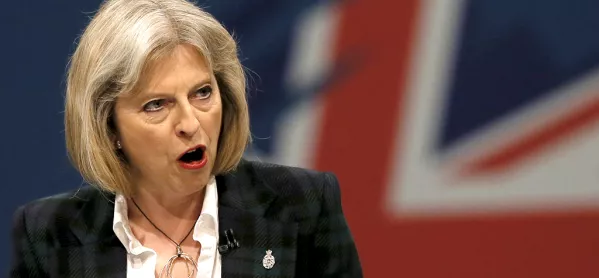Theresa May, who is the longest-serving home secretary for 100 years, is well-known for her work in the Home Office, but where does she stand on education?
Here are six things we know about Ms May’s stance on education:
-
She is state-educated
Ms May had a varied education in both the private and state sector. The vicar’s daughter briefly attended a Catholic private school - St Juliana’s Convent School for Girls in Oxford. At 13 she gained a place at Holton Park Girls’ Grammar School, which, during her time as a pupil, became the Wheatley Park Comprehensive School. She studied geography at St Hugh’s College, Oxford.
-
She served as shadow secretary of state for education and employment from 1999-2001
Newspaper cuttings from 2001 report her criticising government plans to introduce anger management classes for three-year-olds. She said: “At 3, it should be parents who are responsible for ensuring children are behaving properly. The idea of a three-year-old sitting down with a counsellor to discuss anger management is surely taking things too far even by New Labour’s standards.”
-
She may support the return of grammars
Ms May gave her blessing to a grammar school “annexe” in her Berkshire constituency of Maidenhead. The 59-year-old supported the move at the same time that the expansion of the Tonbridge-based Weald of Kent Grammar School in Sevenoaks was being decided.
-
She backs free schools
Ms May has been a vocal supporter of free schools, particularly the Eton-sponsored Holyport College, a state boarding school in her constituency. Nick Timothy, who ran her leadership campaign and also served as her special adviser for five years, is also director of the free school charity New Schools Network.
-
She wants police and crime commissioners to run free schools
Ms May told the thinktank Policy Exchange that police and crime commissioners should have a role in setting up alternative provision free schools, “bringing together the two great reforms of the last Parliament - police reform and school reform”. The move would support troubled young children and prevent them falling into a life of crime, she added.
-
She plans to bring about “serious social reform”
Her speech launching her leadership bid spelled out that she intends to tackle inequality in society, stating that: “If you’re a white, working-class boy, you’re less likely than anybody else to go to university. If you’re at a state school, you’re less likely to reach the top professions than if you’re educated privately.”
Want to keep up with the latest education news and opinion? Follow TES on Twitter and like TES on Facebook




